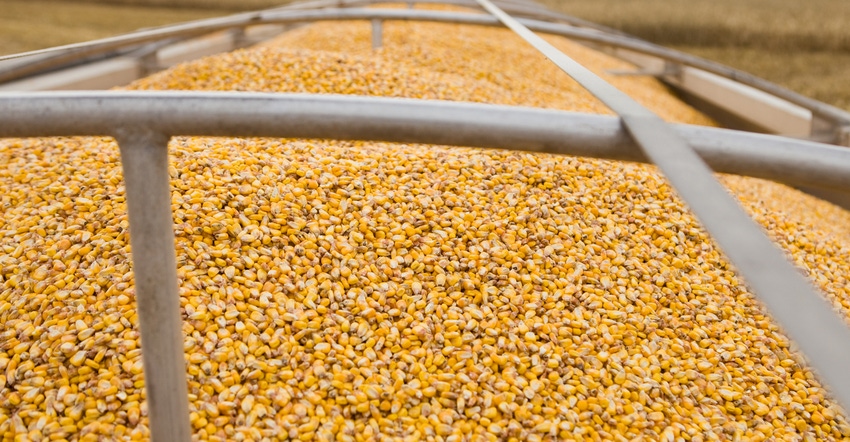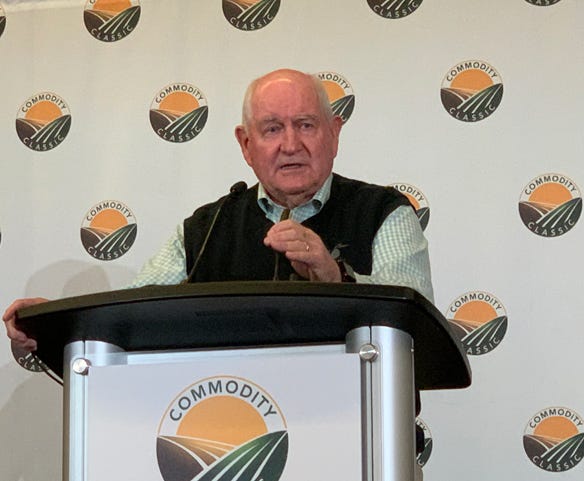
Don’t include a Market Facilitation Program payment in your 2020 farm management plan. That was the message from U.S. Secretary of Agriculture Sonny Perdue to a packed room of farmers and ranchers during this year’s Commodity Classic.
“I don't believe the Market Facilitation Program was created or instituted as a price support program,” Perdue said. “We have safety nets in the form of crop insurance and other things to deal with pricing in that area, and deal with reference prices in that way.”
He admitted the MFP payments helped farmers. “It literally changed the color of some bottom lines,” Perdue said.
Last year, farmers were faced with weather disasters accounting for nearly 20 million in prevented plant acres. And then there were the added trade disruptions that caused many farmers not to be able to market their crops. Much of the grain was held on the farm or in county elevators.
Payments made
The third round of 2019 MFP payments was set to go out at the beginning of February. These payments assist farmers suffering from damage because of trade retaliation by foreign nations. It is based on a single county payment rate multiplied by a farm's total planting of MFP-eligible crops in 2019.
In the end, Perdue said small farmers saw payments on average of $55 per acre, while larger enterprises realized $47.
“We think generally [MFP payments] have been very much accepted and appreciated,” he said. However, it is not a marketing plan for farmers in the future. Rather, farmers may go back to Economics 101 and the basic law of supply and demand. Right now, Perdue contends, there is too much supply.
 MANAGING FOR 2020: U.S. Secretary of Agriculture Sonny Perdue spoke to reporters during this year’s Commodity Classic and said that farmers need to start looking at supply and demand when making planting decisions for their farm.
MANAGING FOR 2020: U.S. Secretary of Agriculture Sonny Perdue spoke to reporters during this year’s Commodity Classic and said that farmers need to start looking at supply and demand when making planting decisions for their farm.

Focus on supply
“When trade is not disrupted or tariffs are not affecting trade, if we see exports flow and markets do not rise in respect to that demand, what does that indicate?” Perdue asked. “Pricing is a function of supply and demand. If demand increases and the price doesn't, that still means that we've got too much supply.”
When farmers make planting decisions on corn and soybeans or other crops, they need to look at supply. Perdue said if the U.S. goes back to export levels seen in the past and prices don't rise, “We need to look at the level of productivity, individually and corporately, in order to adjust that.”
Return to 'normal'?
However, some farmers are waiting for prices to return to agriculture’s golden years of 2009 to 2014. That is the era farmers today tend to use to determine what “profitability in agriculture” looks like, Perdue said. “That is what we like to think is normal,” he said. “I’ve been in agriculture a long time. It wasn’t normal to me. Those were career-high years.”
Perdue said he would love for agriculture to return to those days, but noted it is not here yet. Still, his department is predicting above-average income for farmers given the 30-year average.
“I’m not trying to sugarcoat the fact that farming is not in a gloriously overly profitable period right now,” he added. “But farmers will do what they’ve always done, do the best with what they've got out there, and what they're given from the market perspective.”
However, he noted that if another trade disruption does take place, President Donald Trump stands by farmers and will not let them suffer and be disrupted by any other force. “He will do that,” Perdue added. “He’s got your back.”
About the Author(s)
You May Also Like






